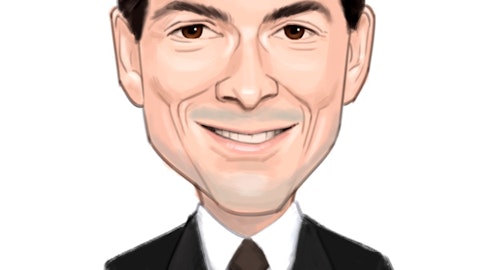We recently published a list of 10 Best Organic Food Stocks to Buy According to Billionaires. In this article, we are going to take a look at where Costco Wholesale Corporation (NASDAQ:COST) stands against other best organic food stocks to buy according to billionaires.
Overview of the Global Organic Food Industry
According to a report by Mordor Intelligence, the organic food and beverages market has a size of $184.87 billion as of 2025. It is expected to grow at a compound annual growth rate (CAGR) of 6.02% between 2025 and 2030, reaching $247.63 billion at the end of the forecast period. At present, North America is the largest market for the sector. However, Asia Pacific takes the lead as the fastest growing.
The primary cause behind the growth of the global organic food and beverage market is the increasing adoption of natural and healthy food and beverage options by consumers. Consumers are exhibiting growing inclination and awareness towards the health benefits of organic food products, which is continually acting as the primary stimulus for this industry.
READ ALSO: 12 Best Cruise Stocks to Buy According to Hedge Funds and 14 Best Farmland and Agriculture Stocks Buy Now.
Is the Organic Farming Sector Expanding?
Published by the Research Institute of Organic Agriculture (FiBL) and IFOAM—Organics International, the 25th edition of the yearbook “The World of Organic Agriculture” shows that the organic farming sector is undergoing significant growth and expansion. It reported that the area under organic management reached around 96.4 million hectares by the end of 2022, reflecting a significant 26.6% growth compared to the previous year. This translates to an expansion of 20.3 million hectares.
The report also showed that the United States took the lead as the largest market in the sector, valued at around EUR 56.6 billion in 2022. Germany followed close behind at EUR 15.3 billion, while China took the third spot at EUR 12.4 billion. The United States and Canada underwent growth in retail sales in the sector, reflecting increases of 4.4% and 9.7%, respectively. These trends show that consumers are increasingly showing interest in organic products, and health consciousness and awareness are supporting demand in North America.
However, these trends are not concentrated in North America alone. The report showed that expansion in organic farming areas occurred across all continents, bringing to life a global trend towards organic food intake and sustainable agricultural practices. The number of organic farmers also rose globally, increasing to 4.5 million in 2022 and reflecting an approximately 26% rise from 2021.
Our Methodology
In this article, we first sifted through ETFs and financial media reports to compile a preliminary list of stocks. We then examined Insider Monkey’s exclusive database of billionaire stock holdings to select the 10 best organic food stocks with the most billionaire investors. These billionaires are founders or managers of some of the world’s leading hedge funds and companies.
Why are we interested in the stocks that hedge funds pile into? The reason is simple: our research has shown that we can outperform the market by imitating the top stock picks of the best hedge funds. Our quarterly newsletter’s strategy selects 14 small-cap and large-cap stocks every quarter and has returned 275% since May 2014, beating its benchmark by 150 percentage points (see more details here).

A customer in a warehouse aisles, browsing the wide range of branded and private-label products.
Costco Wholesale Corporation (NASDAQ:COST)
Number of Billionaire Investors: 16
Number of Hedge Fund Holders: 96
Costco Wholesale Corporation (NASDAQ:COST) operates membership-only big box warehouse club stores and is one of the most popular department stores in the US. It offers its customers an elaborate range of organic food and beverages, along with other offerings.
Despite weakening consumer sentiment and inflation, Costco Wholesale Corporation (NASDAQ:COST) delivered strong comparable sales in fiscal Q2 2025, rising 9.1% (excluding fuel prices and currency exchange) and reflecting strong demand for its offerings. The company’s e-commerce sales also grew by 22.2%, demonstrating strong consumer appetite.
Costco Wholesale Corporation (NASDAQ:COST) is one of the most resilient retailers in the sector, and its membership fees are pivotal to its profit generation. In fiscal 2024, the company made $4.8 billion in membership fees. It recently increased its base membership fee to $65, which will be reflected in the current fiscal year’s earnings. Its paid members have also grown by 7% annually over the last two years.
Costco Wholesale Corporation (NASDAQ:COST) is also continually expanding its operations, ending fiscal Q2 2025 with 897 warehouses. It added 29 stores last year, expanding its store base by roughly 3%. On March 21, Stifel Nicolaus analyst Mark Astrachan maintained a Buy rating on the company and set a price target of $1,035.00.
Overall, COST ranks 3rd on our list of best organic food stocks to buy according to billionaires. While we acknowledge the potential for COST as an investment, our conviction lies in the belief that some AI stocks hold greater promise for delivering higher returns and doing so within a shorter time frame. There is an AI stock that went up since the beginning of 2025, while popular AI stocks lost around 25%. If you are looking for an AI stock that is more promising than COST but trades at less than 5 times its earnings, check out our report about the cheapest AI stock.
READ NEXT: 20 Best AI Stocks To Buy Now and 30 Best Stocks to Buy Now According to Billionaires.
Disclosure: None. This article is originally published at Insider Monkey.





